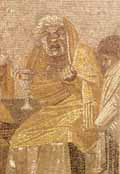Greek Comedy - Outline
The principal focus of the module will be Aristophanes, the only poet of the 'Old Comedy' of fifth-century Athens whose plays survive intact. We shall consider a selection of his extant plays in their cultural and political context, paying particular attention to the following: distinctive stylistic and comedic techniques such as characterization, plotting, and the nature of Aristophanic humour; the plays' place within the framework of the state-sponsored festivals; their relevance to contemporary social life.
Additionally, Aristophanes' rivalries with other contemporary dramatists will also be investigated; particular attention will be devoted to Cratinus and Eupolis, in line with a recent upsurge in interest in and knowledge of the fragmentary remains of other principal fifth-century comedians.
Attention will also be paid to: the status of Old Comedy within ancient literary and cultural criticism; relations with contemporary intellectual and sophistic concerns; relations with other poetic forms - most notably tragedy, but also lyric and epic poetry. This module would work as a natural complement to CX310 Politics and Poetics in Classical Literature; CX205 Greek Tragedy; CX250 Classical Views of Literature and the Visual Arts; CX235 Democracy and Imperialism in Classical Athens
Aims
- to give a broad knowledge of fifth-century Greek Comedy and its development as a genre
- to explore the main themes and distinctive characteristics of Old Comedy
- to develop an understanding of the plays within their social and cultural, including literary, contexts
Objectives
By the end of the module students should have:
- a thorough knowledge of the plays of Aristophanes in context
- acquired an understanding of the connections between, and potential similarities and differences between, Aristophanes and other fifth-century Athenian comic dramatists
- developed an ability to formulate arguments on the basis of their reading and to assess critically the interpretations of modern scholars in relation to the ancient material

